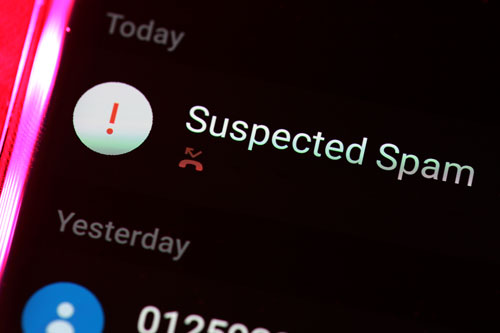Think you’re safe because you don’t cold-call? Think again
If you’re a dealership conducting any form of outbound phone call campaigns, let’s say it’s about a customer’s oil change, for example, the unfortunate reality is that any of your calls are at risk of displaying as ‘Spam Likely,’ ‘Potential Scam,’ or ‘Fraud’ on the customer’s mobile phone. Because dealers are typically unaware of how their calls display on mobile devices across the Verizon, AT&T, and T-Mobile customer networks, many falsely assume that if they’re only calling their existing customers, they won’t be negatively labeled… think again.
Negative call labels can affect any type of communication, from customer service calls to pick-up reminders, delivery alerts, billing communications, security or safety notifications, and the list goes on.
No dealership is immune to experiencing some type of improper call blocking and labeling in today’s evolving communications ecosystem. Whether you’re cold-calling a leads list, getting in touch with a known customer about an upcoming appointment, or trying to schedule an oil change with one of your current customers, being negatively tagged as a Spam caller is always possible.
Anyone can be Labeled Spam, Even You
The reason why any of your calls, regardless of the type of call, could be mislabeled with tags like Scam Likely, is because of the FTC and FCC’s response to consumer complaints about the outrageous volumes of illegal robocalls disrupting their days and, sometimes, their wallets. Think “your car’s extended warranty” type of scam call; they’ve unfortunately harmed your reputation without you having done anything wrong.
To protect consumers from being scammed by those types of scam calls, the FCC introduced call-blocking and labeling technologies, like 3rd party analytics engines used by the major carriers, to block and label the actual illegal and fraudulent calls. But, because the focus was on the illicit callers pretending to be you, legitimate callers, like you at your dealership, was overlooked and ended up suffering unintended consequences like drops in contact rates and customer engagement. What makes this an ongoing problem is how the algorithms used by the analytics engines to label calls are constantly updating, which means spam labels can often reappear.

[Image Caption: Real screenshots of how your calls may be delivered and presented]
Algorithms aren’t human, and they certainly aren’t perfect. They can’t distinguish who it is your calling and why, which means no matter who you call or why you’re calling them, you’re always at risk of being improperly labeled.
Protecting your calls = Protecting your Dealership’s identity
Dealer Identity knows that trust in your phone calls starts with vetting and protecting your dealership’s calling identity. This is where we step in. Start by verifying your identity and your authorized use of the phone numbers you use — whether you use them to call existing customers or new leads. We then register those phone numbers with the analytics used by the major wireless carriers and provide ongoing monitoring services, and correct improper labels should they appear on any of your registered phone numbers. This helps you protect your brand identity and reputation so that every conversation doesn’t start off on the wrong foot (or not start at all!).
If you haven’t started an investigation into whether or not call labeling is impacting your ability to connect, reach out today for recommendations on how to get started.
Questions? Contact jake@dealerIdentity.com, and he can answer any questions you may have.


